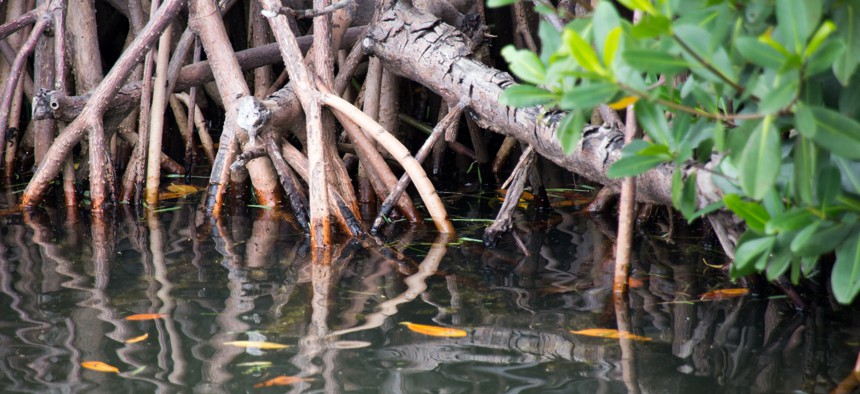Policy
The new 'blob': How sargassum seaweed assaults Florida mangroves
Meet the scientists testing what Florida’s most important plant can withstand.

Photo by Florida-Guidebook.com on Unsplash
Florida’s coasts are threatened by long, snarling lines of sargassum, a plant that washes up in bulky tendrils along Florida’s shores, deters tourists and overwhelms local habitat.
But despite it being an unnerving, invading presence in huge quantities – it’s as natural to the state as Florida’s alligators.
Seaweed from the Atlantic’s Sargasso Sea shows up in large rafts that then rot on Florida beaches. As it decomposes, the brown seaweed produces a smell like rotten eggs and decays into nutrients that run off along the coast.
Add to this the combination of human-caused nutrients and pollutants and the flora along Florida’s coasts have a weighty task of cleanup and filtration.
Previous coverage from CD Davidson-Hiers – Mangroves: Nature's not-so-secret weapon against rising seas
Meet Dr. Loraé Simpson, director of research and conservation with the coastal nonprofit Florida Oceanographic Society, who is looking into how mangroves – the state’s coastal protectors – can survive when large clumps of sargassum hit home.
“In Florida, we have done an amazing job at cutting down most of our mangroves; there’s really not that many left,” Simpson said. “Trying to understand how to protect those mangroves and trying to understand how they can be as resilient as possible is really important.”
The question in sargassum
A mangrove ecologist, Simpson has been asking this question in her studies: “How does nutrient enrichment affect mangrove growth and productivity?” The outcome will tell her and other scientists how mangroves may survive what is an onslaught of nutrition – from humans and from the nonhuman wilds, including sargassum.
Earlier this summer, Floridians braced for the impact by what was described as a “huge blob of seaweed” by publications such as CNN and other national news outlets. In mid-March, during the known sargassum season, clumps of the weeds washed ashore in beach towns from Fort Lauderdale down through the Space Coast.
Though a regular occurrence, residents still breathed (healthier) sighs of relief as reports came in that the floating mass heading toward the coast had shrunk by 75%. An April report out of the University of South Florida had estimated sightings of 3 million tons of seaweed in the Caribbean Sea.
To find out what mangroves can withstand, Simpson feeds incremental amounts of Sargassum to 1-year-old black mangrove seedlings. At her site near the Indian River Lagoon, she was looking for the “bell curve” of nutrient load that the young mangroves can tolerate. So far, about 200 grams and her young mangroves begin to die.
Nutrient levels – too much and too little – will impact how well the mangroves can withstand hurricane winds that rip through each season or freezing temperatures as mangroves continue to move northward. Simpson now is searching for what the next mortality level is for mangroves, increasing the nutrient load to 250 grams, or what compares to feeding the seedlings about a gallon of ice cream of sargassum.
“If you were to cup your hands, it’s a big amount in your (two) cupped hands,” she said. “(But) for all intents and purposes, this is nothing compared to what’s washing up on the beaches.”
What makes a mangrove?
Many Floridians and transplants might say it’s the swampy smell of mangroves that distinguishes them from the brightly-colored tropical plants that attract new homeowners.
Mangroves are not the flamboyant bird of paradise with its splayed bright petals, nor the mango trees bearing fruit for passersby to pluck.
Mangroves are a collection of expansive, leafy plants native to and adapted perfectly for tropical climates that inhabit the coasts of Florida. Some send out roots that pop up out of the sediment like hundreds of tiny soldiers, others have prop roots that reach like fingers down into the sand.
All have adapted to life in or near salt water and can filter salt from the water they drink, expelling the crystals on their leaves.
It is widely understood that mangroves act as nurseries for many of the fish that call coastal Florida home and sharks and migratory birds are included among their tenants. Though protected by the Florida Department of Environmental Protection, mangroves are still targeted by homeowners and resorts for a variety of reasons.
But mangroves are not a single species of plants.
“There’s no family of mangroves,” Dr. Ilka “Candy” Feller said. She’s a mangrove ecologist and scientist emeritus with the Smithsonian and a longtime mentor to scientists such as Simpson. “There are nine or 10 families of plants that could be mangroves. It’s where they can live and what they can do when they’re there.”
Mangroves protect inland Florida from storm surges by acting as a buffer against waves, which, in turn provides a natural economic value to Florida homeowners – imperative as climate changes.
“Why do we cut down all our mangroves and put sea walls up?” Simpson said, echoing frustrations from scientists, citizens and researchers throughout the state.
The plants also help store carbon, a major environmental boon and one that is getting more attention as the effects of a changing climate are more widely felt.
“Some mangroves put more carbon below ground than others do,” Feller said. Yet the shoreline continues to deteriorate, and Feller will show someone a black mangrove “and they haven’t a clue it’s a mangrove.”
The siege of sargassum
Sargassum itself is home to myriad creatures – including small fish, crabs, turtles and other marine life. Yet when it reaches shore in great clumps, it can build feet high and release toxic fumes as it decays.
The seaweed breaks down into nutrients that are recycled into the plants nearby – including certain species considered mangroves such as red, black, white and buttonwood – and add to the human-caused nutrient loads already weighing down what the plants must filter out in order to survive.
“(These nutrients) affect (mangroves’) growth rate, how tough their leaves are, their wood,” Feller said. She pointed to Simpson’s work for being able to provide pieces of a larger picture: “Things don’t happen in isolation.”
Would eliminating all fertilization fix Florida’s climate problems?
Some communities across the state already limit fertilization in an effort to keep runoff out of the surrounding ecosystems. Some might ask if eliminating added fertilizers entirely could save mangroves and fix the state’s contributions to climate issues.
“No, it wouldn’t,” Feller said. In one of her own previous experiments, she found that cutting off nutrients meant mangroves became more sensitive to hurricanes. In another part of the world, Australian mangrove plants became more vulnerable to the effects of drought.
To see the effect on an ecosystem, it means paying attention to details for a long time. “It takes taking a hard look; it’s not a broad brush,” Feller said.
Seeing it through
Simpson will continue her work through the regular sargassum season, which typically lasts until September.
The mangroves she’s studying are in pots and when Simpson goes to answer her main question, she’ll dissect the plant and take measurements of the nutrients in the soil. Her findings will be shared throughout the Florida Oceanographic Society’s network and may prompt projects to support existing mangrove forests.
“We’re losing all those services (mangroves) provide,” Simpson said. “Nutrient cycling, wave attenuation – I think just keeping our eyes on all these trees. Just because they look OK doesn’t necessarily mean they’re OK.
“(Mangroves) are a foundation species, so we need to be vigilant.”
Annamarie Simoldoni contributed reporting. CD Davidson-Hiers is a Florida-born journalist and writer who grew up on a 40-acre horse farm in the Panhandle. Her sense of place and home is rooted in the swamps and wilds of her state.
NEXT STORY: 'Dysfunctional and unprofessional': Tensions flare during Florida Atlantic University meeting
